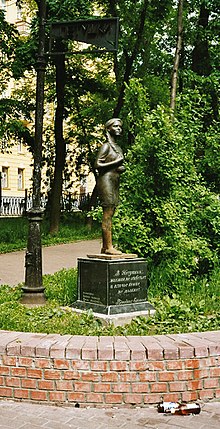The trip to Petushki
The trip to Petuschki ( Russian Москва - Петушки , literally "Moscow - Petushki") is the most famous literary work of the Russian writer Wenedikt Erofeev (scientific transliteration: Venedikt Erofeev). According to the closing note, it was drawn upin the autumn of 1969"when the telephone cables were laid in Sheremetyevo ". It was first published in the Israeli magazine Ami in 1973. The first edition in German was published by Piper Verlag in 1978.
The author himself described his work as a " Poem "; in fact, it is difficult to correctly classify it as a genre. For the superficial observer, the work represents a train journey by the protagonist Wenedikt ("Wenja") Erofejew, who becomes increasingly drunk during the action.
content
action
The framework of the plot is formed by a day in the life of the alcoholic and first-person narrator of the same name as the author Wenedikt ("Wenja") Erofejew, on which he tries to use a suburban train from the Kursk train station to his living in the small town of Petushki ( Vladimir Oblast ) To arrive beloved. In the course of this train ride, the protagonist gets drunk and the descriptions become more and more surrealistic. During the journey, historical figures and, towards the end, increasingly monstrous mythical creatures (like the Greek sphinx ) appear. Finally apocalyptic darkness descends, and Wenja, who sits unnoticed on the wrong train after getting on and off at one of the stations, drives back to Moscow . Arrived at the starting point of the journey again, the now completely confused hero is attacked by four dark figures, brutally mistreated and loses his consciousness forever.
people
All the people appearing seem to be alcoholics or at least to consume alcohol and to languish in the sadness of the Soviet wasteland. The reader comes across them exclusively through Wenja himself, be it through memories or his monologue-like descriptions. The hero's lover appears as an illusion-like idea in his world of thought and, through her inaccessibility, symbolically leads the coming communist paradise ad absurdum.
shape
The collage-like text contains party slogans as well as allusions to art, especially to European literature and music, and the Christian Bible is often quoted. In terms of form and content, the reader is confronted with an extraordinarily complex and seemingly bizarre work that gives him deep insights into the protagonist's world of thought; in fact, the reader never leaves them. In his intellectual monologues, the alcoholic also describes the Soviet system in a humorous way.
reception
The work was distributed via samizdat (private, illegal duplication and distribution of copies according to the pyramid scheme). It was one of the most popular works of Russian underground literature. It was first officially published in the Israeli magazine Ami in 1973, followed by translations into French (1976), German (1978) and English (1980).
In 2005, the Verlag Kein & Aber published a retransmission from Russian into German. The translator Peter Urban placed particular emphasis on the scientifically correct translation and interpretation. This is evidenced, for example, by a detailed commentary, a comprehensive afterword and a short biographical note by the author. However, this re-translation has met with controversy. One criticism states, among other things, that “Ms. Spitz [note: translator of the first version] knows where a punchline belongs, namely at the end of a sentence. Perhaps she phrased it less faithfully, but in any case more original than Urban ”.
monument
In Moscow, on Battle Square ( Ploschad Borby, near the intersection of Dostoyevskovo and Novosushchevskaya ulitsa), there is a monument to the novel, which was designed by the artists Valeri Kuznetsov and Sergei Manzerew.
On one side you can see a man holding onto a train sign that reads "Moscow". On the pedestal is the inscription: "After all, you can't give anything to the opinion of a person who has not yet got the chance to drink their heads clear!"
On the other side is a young woman at a train sign that says "Petuschki". Below you can read: "In Petushki the jasmine never fades and the birdsong never fall silent."
expenditure
- Москва - Петушки. In: Ami. No. 3, 1973
- Translations into German
- Wenedikt Erofejew: The trip to Petushki. A poem. Translated from the Russian by Natascha Spitz. Piper, Munich / Zurich 1978, ISBN 3-492-02363-0 ; 12th edition: ibid. 2008, ISBN 3-492-20671-9 .
- Venedikt Erofeev: Moscow – Petuški. A poem. Newly translated and with a comment by Peter Urban. No & But, Zurich 2005, ISBN 3-0369-5141-5 .
- Sound carrier
- Wenedikt Erofejew: The trip to Petushki. Recorded live on January 27th, 1998 in the Literaturhaus Hamburg. Read by Robert Gernhardt , Harry Rowohlt , Josef Bilous. Translation: Natascha Spitz. Direction and editing: Katarina Blarer and Peter Chaag. 4 CDs. Kein & Aber, Zurich 1998, ISBN 3-906547-70-1 .
literature
- Neil Stewart: "Vstan 'i vspominaj". Resurrection as a collage in Venedikt Erofeev's "Moskva-Petuški" (= Heidelberg publications on Slavic Studies, B, literary series. Vol. 10). Lang, Frankfurt [a. a.] 1999, ISBN 3-631-34389-2
- Vladimir Tumanov: The End in V. Erofeev's Moskva-Petuški. In: Russian Literature. 39, 1996, pp. 95–114 ( PDF; 1.695 MB )
Web links
- Moscow – Petuschki , website for the book by Connie Müller-Gödecke
Footnotes
- ↑ Klaus Caesar Zehrer : Humor criticism special: Jerofejew vs. Erofeev . In: Titanic . December 2005
- ↑ Progulyaemsya: Памятник Москва-Петушки

